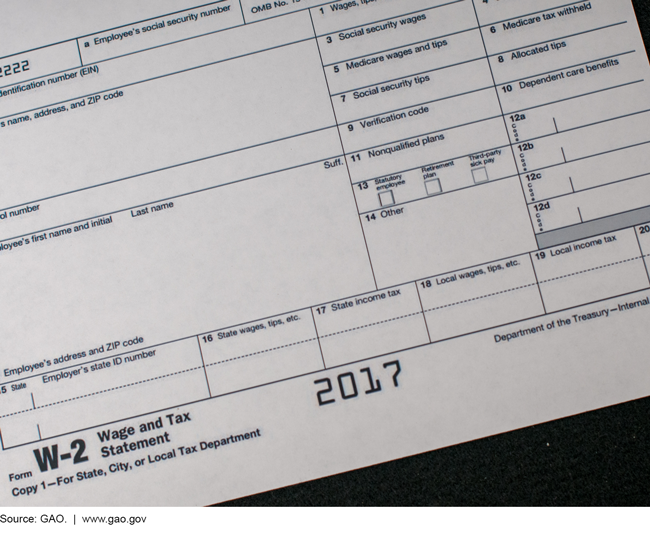Tax Information Returns: Shared Service Centers Generally Transmitted Federal Wage and Tax Data on Time for Tax Year 2016
Fast Facts
Timely reporting of employee wage and tax information helps authorities detect tax fraud, enforce tax laws, compute Social Security benefits, and combat identity theft. Congress moved up the deadline for all employers to report this information—including federal employers.
Federal agencies generally use four shared service centers to process and transmit their employees' tax information to states and the IRS. We found the centers, for the most part, met the new deadline. Our survey of states found they generally received information on time, and generally did not require the service centers to retransmit W-2 data.

Photo of a W-2 form.
Highlights
What GAO Found
Federal agencies generally use one of four payroll shared service centers (SSCs) to process employee timesheets, assure withheld tax is paid, and send Form W-2 Wage and Tax Statement (W-2) data to the Social Security Administration (SSA) and state tax authorities. GAO found these SSCs generally sent this W-2 data to SSA and states in a timely manner for tax years 2015 and 2016. However, SSCs varied somewhat in their timeliness for transmitting W-2 data to states. For example, the Defense Finance and Accounting Service generally transmitted the W-2 data for 2016 on time to the states, except for 1 of its 10 components; however, the National Finance Center (NFC) transmitted the W-2 data past the due dates for more than half of the states for tax year 2016. NFC officials cited various problems that they said should largely be resolved in the future. In response to GAO's email survey of states with individual incomes taxes and the District of Columbia, states indicated that they generally received W-2 data on time from the SSCs, including NFC, and generally did not require SSCs to retransmit the data to make corrections.
Three SSCs reported making either minor scheduling changes or no changes to meet the new SSA filing deadline, while another said it needed to use overtime and an additional staff member.
Why GAO Did This Study
Form W-2 data help the Internal Revenue Service (IRS) and state tax authorities detect tax fraud, enforce tax laws, and combat identity theft. For the matching process to work best, tax authorities must have the W-2 data before issuing refunds. During a 2015 Senate Finance hearing, representatives of a state tax authority testified that federal agencies were not sending W-2 data soon enough for them to use before issuing tax refunds. The hearing was a factor in Congress passing a law to move the filing deadline for W-2 data to January 31 from March 31, a date that a majority of states now match.
GAO was asked to review the processes that SSCs use to transmit W-2 data to SSA and the states. This report 1) assesses the extent to which the federal SSCs transmitted timely and correct W-2 data to SSA and state tax authorities for tax years 2015 and 2016, and 2) describes what changes in procedures, if any, the federal SSCs made to meet the new January 31 filing deadline for transmitting W-2 data to SSA. GAO compiled W-2 data from each of the four SSCs on when they transmitted the data and compared that data to the due dates as posted by the states and the District of Columbia.
GAO also surveyed relevant state tax authorities and the District of Columbia about when they received the tax year 2016 W-2 data, as well as what their experiences were in receiving these data from the four SSCs. One of these experiences was how often these surveyed states reported that the SSCs had to retransmit the W-2 data. Additionally, GAO interviewed relevant officials at the four SSCs, SSA, IRS, and an association of state tax authorities.
The Department of Agriculture (Agriculture), the Department of Defense (Defense), the General Services Administration (GSA), the Department of the Interior (DOI), IRS, and SSA reviewed a draft of this report. DOI agreed with the report's findings. Agriculture and Defense did not indicate whether they agreed, although both provided technical comments, which GAO incorporated as appropriate. GSA, IRS, and SSA had no comments.
For more information, contact Jessica Lucas-Judy at (202) 512-9110 or lucasjudyj@gao.gov.
